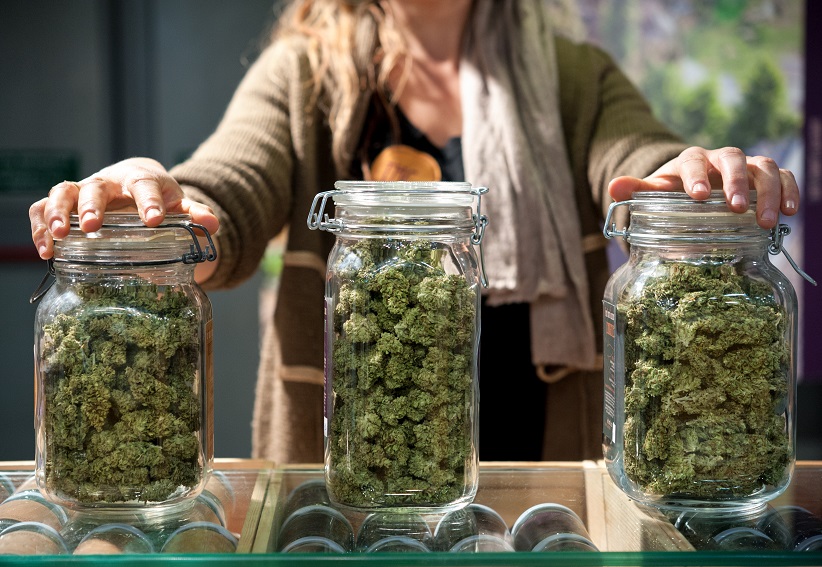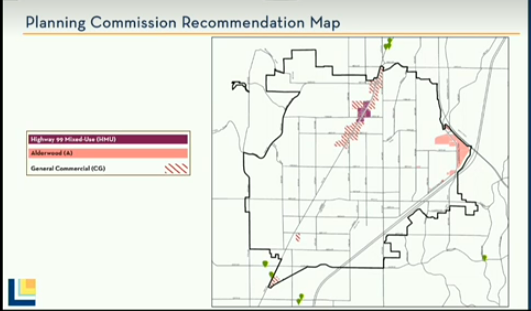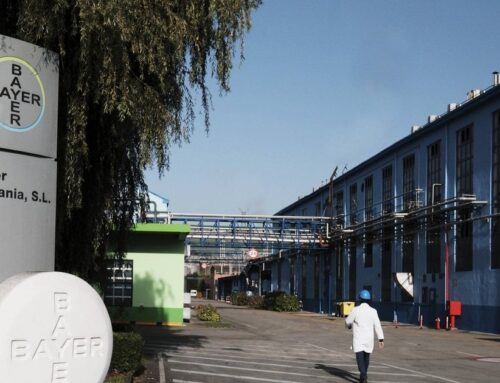Lynnwood to consider allowing retail cannabis sales in the city
April 23, 2025
LYNNWOOD—The Lynnwood City Council heard from Planning Commission staff regarding allowing retail cannabis sales within the city limits, at a Work Session Monday, April 21.

As of today, there are no recreational cannabis stores within Lynnwood city limits, despite four licenses (or title-certificates) allocated to the city by the state. All four of these licenses, which are issued by the Washington State Liquor and Cannabis Board, are accounted for by individuals who must wait for the city’s approval before they are reinstated as retail licenses. Additional licenses could be awarded to the city in the future if it raises the allowable retailers.
There are, however, retail cannabis stores nearby Lynnwood whose official border jurisdictions fall within unincorporated Snohomish County.
Washington State voters approved I-502 in 2012, which legalized the production, processing, and retail sales of cannabis.
In response, the City of Lynnwood enacted a series of moratoriums prohibiting the sale of retail cannabis within city limits beginning in June 2013, through February 2015.
A City ordinance, 3136, adopted June of 2015, revoked these moratoriums and implemented a final prohibition of retail sales, production and processing, and medical marijuana collective gardens.
At Monday’s meeting Karl Almgren, AICP, Planning Manager, and Rebecca Samy, Principal Planner, presented a brief overview of the Planning Commissions recommendations to the City following an extensive analysis.
The Commission’s’ recommendations to council were to pass an ordinance that would allow retail cannabis in the following zones: Highway 99 Mixed Use (HMU), General Commercial, and Alderwood subject to the following conditions:
- Provide a minimum 1,000-foot buffer on Highway 99 Mixed Use and General Commercial zones for restricted entities which are allowed to reduce buffer.
- Provide a minimum 300-foot buffer in Alderwood zone for restricted entities which are allowed to reduce buffer
- And require landscaping, parking, and other standards required for retail use in the underlying zones.
The Commission also recommended that Council reevaluate the City Center zone for retail cannabis after the construction of Town Square Park.
One of the City Council members pushing for recreational stores in Lynnwood is City Council President George Hurst, who was originally on the planning commission when the City’s moratorium was enacted in 2015.
Hurst previously made a motion, at A council meeting on September 23, 2024, directing the Lynnwood Planning Commission to carry out a thorough review of the current zoning limitations and restriction pertaining to retail cannabis. Also, in that motion the Planning Commission was directed to develop a comprehensive set of recommendations that would amend the City’s zoning code and regulations to allow for retail cannabis stores in certain zones.

State law, both RCW’s 69.50 and 314-55 WAC, regulates where retail cannabis stores can be located, how they are advertised, enforced, and licensed. For example, state law prohibits retail cannabis stores within 1,000 feet of elementary or secondary schools, childcare centers, public parks, recreation centers, and game arcades not limited to 21+ crowds.
The Council previously discussed these regulations during its February 23 meeting in preparation for Monday’s presentation, and subsequent considerations.
The Liquor and Cannabis Board presented findings to the Lynnwood Planning Commission last September, reporting that neighboring jurisdictions with the same number of allotted licenses – Edmonds, Mountlake Terrace – experienced tax revenues in the $100’s of thousands since allowing retail cannabis within their cities.
Council President Nick Coelho noted that the Planning Commission’s recommendations of a 300-foot buffer in the Alderwood zone would essentially restrict that area from having any retail cannabis stores given the existing Dave and Busters. He also asked for clarification regarding why the Planning Commission is recommending establishing retail cannabis opportunities in the City Center ahead of establishing Town Hall Park.
Almgren noted that if council were to move forward with their recommendation that retail cannabis stores could set up shop in the City Center ahead of the park’s construction and essentially be permitted to operated, by way of being “grandfathered” in. Still, Almgren, on behalf of the Planning Commission, suggested Council consider allowing retail cannabis stores near City Center after Town Hall Park becomes a reality – sometime around 2030.
Councilman Patrick Decker opposed the ordinance reminding council that the Washington Department of Health spends millions of dollars annually on prevention and intervention of cannabis use.
“Facilitating an activity that our tax dollars are going to prevent seems counterproductive to me,” said Decker. “We’re continuing to see studies on cannabis use and long-term impact of that from the Department of Health website [including] cognitive impairment, dependance on cannabis, psychosis, paranoia and anxiety, more severe cannabis withdrawal, severe digestion issues, nausea, and vomiting caused by cannabis use.”
Councilman Hurst argued that the same could be said about nicotine/tobacco and alcohol.
“To use your logic Councilman Decker maybe we become a dry city, and we just ban alcohol in this city,” said Hurst. “Through a vote of the residents of Washington, we legalized cannabis. This is a legal business in this city. We don’t have buffers for the sale of alcohol. I just look at this as we are restricting a business from coming into our city.”
Decker responded that Hurst’s way of thinking could lead to the “degradation” to the city of Lynnwood because it opens the door to allowing all “vices” – including hard drugs like heroin – into the City.
The next steps are for the Planning Commission to draft an ordinance which will then be voted on by the Council at a future meeting. The hope is to make a decision by the implementation of the City’ Unified Development Code (UDC), which goes into effect at the end of June. The City needs to inform the Department of Commerce within 60-days of its decision which falls on Wednesday, April 23.
The fast track to drafting an ordinance such as this, according to Almgren, is 75-days.
Some council members failed to see the rush, with others confused why the meeting was the first-time hearing about the tight deadline. Councilman Decker voiced preference that council wait until the public had the opportunity to chime in, which Councilwoman Derica Escamilla echoed.
So far there has been no word on when the conversation will continue.
Search
RECENT PRESS RELEASES
Related Post





